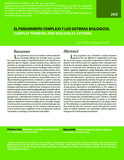| dc.rights.license | http://creativecommons.org/licenses/by-nc-sa/3.0/ve/ | es_VE |
| dc.contributor.author | Uzcátegui-Varela, Juan Pablo | |
| dc.date.accessioned | 2025-04-10T18:36:15Z | |
| dc.date.available | 2025-04-10T18:36:15Z | |
| dc.date.issued | 2025-04-10 | |
| dc.identifier.issn | 0798-3069 | |
| dc.identifier.uri | http://www.saber.ula.ve/handle/123456789/51587 | |
| dc.description.abstract | Los organismos vivos se consideran sistemas dinámicos
complejos difíciles de entender, pues no aceptan
argumentos vagos o superficiales frente a las leyes físicas y
químicas que los regulan, aunque tampoco estas, explican con
precisión su comportamiento. La teoría de sistemas complejos
se ocupa de identificar y caracterizar el enfoque holístico requerido
para estudiar moléculas, células y sus interacciones, sin reducirse
a unos pocos criterios teóricos. Cada componente del
sistema participa en el intercambio de energía e información,
generando propiedades emergentes imprevisibles que se van
desarrollando progresivamente mediante un patrón evolutivo
a favor del equilibrio homeostático. La naturaleza dinámica del
sistema biológico muestra una impresionante multiplicidad de
enfoques, descripciones y definiciones; al respecto, ante al pluralismo
muchas veces empírico adoptado para el análisis de sistemas
biológicos, seguir una jerarquía epistemológica basada
en la conceptualización del sistema vivo, el ajuste a las nuevas
perspectivas e identificando tendencias actuales en el pensamiento
complejo, parece ser la mejor opción para agrupar con
orden los elementos sistémicos dispersos en el análisis integral.
A continuación, se presenta una revisión sistematizada que asocia
el pensamiento complejo con los criterios comunes que la
ciencia práctica busca equilibrar entre el enfoque de sistemas
sostenibles, la biología y su fundamento filosófico. | es_VE |
| dc.language.iso | es | es_VE |
| dc.publisher | SaberULA | es_VE |
| dc.rights | info:eu-repo/semantics/openAccess | es_VE |
| dc.subject | Aristóteles | es_VE |
| dc.subject | Complejidad | es_VE |
| dc.subject | Enfoque holístico | es_VE |
| dc.subject | Metabolismo | es_VE |
| dc.subject | Teoría sistémica | es_VE |
| dc.title | El pensamiento complejo y los sistemas biológicos | es_VE |
| dc.title.alternative | Complex thinking and biological systems | es_VE |
| dc.type | info:eu-repo/semantics/article | es_VE |
| dc.description.abstract1 | Living organisms are considered complex dynamic
systems that are difficult to understand, since they
do not accept vague or superficial arguments in the face of the
physical and chemical laws that regulate them, although even
these do not precisely explain their behavior. Complex systems
theory is concerned with identifying and characterizing the
holistic approach required to study molecules, cells and their
interactions, without being reduced to a few theoretical criteria.
Each component of the system participates in the exchange of
energy and information, generating unpredictable emergent
properties that progressively develop through an evolutionary
pattern in favor of homeostatic equilibrium. The dynamic nature
of the biological system shows an impressive multiplicity
of approaches, descriptions and definitions; in this respect, in
view of the often empirical pluralism adopted for the analysis
of biological systems, following an epistemological hierarchy
based on the conceptualization of the living system, adjusting
to new perspectives and identifying current trends in complex
thinking, seems to be the best option to group in an orderly
manner the systemic elements dispersed in the integral analysis.
The following is a systematized review that associates complex
thinking with the common criteria that practical science
seeks to balance between the sustainable systems approach,
biology and its philosophical foundation. | es_VE |
| dc.description.colacion | 260-279 | es_VE |
| dc.description.email | revistafermentum@gmail.com | es_VE |
| dc.description.email | uzcateguij@unesur.edu.ve | es_VE |
| dc.description.frecuencia | Cuatrimestral | |
| dc.description.paginaweb | www.saber.ula.ve/fermentum | |
| dc.identifier.depositolegal | pp1991102ME302 | |
| dc.publisher.pais | Venezuela | es_VE |
| dc.subject.institucion | Universidad de Los Andes | es_VE |
| dc.subject.keywords | Aristotle | es_VE |
| dc.subject.keywords | Complexity | es_VE |
| dc.subject.keywords | Holistic approach | es_VE |
| dc.subject.keywords | Metabolism | es_VE |
| dc.subject.keywords | Systemic theory | es_VE |
| dc.subject.seccion | Revista Fermentum: Artículos | es_VE |
| dc.subject.tipo | Artículos | es_VE |
| dc.type.media | Texto | es_VE |


